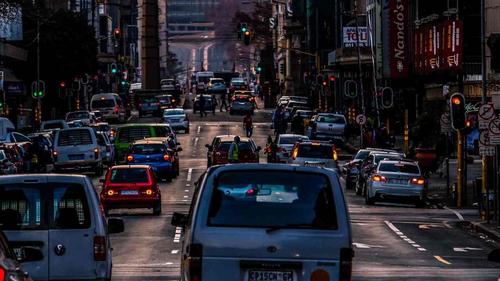News
Chaos and corruption plague Africa’s richest city – leading to its decline

Johannesburg is falling apart. Its residents feel the strain of a deteriorating city. Solomon Owa, a 51-year-old tailor, runs his business from his garage, relying on his sewing machine to make a living. However, frequent power outages disrupt his work, leaving him idle for up to 10 hours daily. As he works surrounded by colourful material, he feels the urgency to seize every moment of electricity to keep his business running.
According to Bloomberg, South Africans have grown accustomed to the challenges of a crumbling infrastructure. From charging devices to rushing through showers before the hot water disappears and leaving home before traffic lights malfunction, daily life requires constant adaptation. Schools, hospitals, restaurants, and businesses rely on backup generators to keep their operations running smoothly. In a distressing scene, homeless individuals even guide vehicles through potholed streets in exchange for cash.
Johannesburg’s plight mirrors the broader collapse of essential services throughout South Africa. The city’s governance crisis lies at the heart of its dysfunction. Since the African National Congress lost control of the city in 2016, unstable coalitions have resulted in a staggering six mayors in just four years. The current mayor represents a party that holds only 1% of the municipality’s 270 seats, exacerbating the challenges faced by the city.
Also read: Joburg mayor confident in city’s budget amidst challenges
The deteriorating services and maintenance are evident, but one of the most significant issues is the rolling blackouts imposed by Eskom Holdings SOC Ltd., the state-owned power utility. These power cuts can last up to four and a half hours. Johannesburg urgently requires 300 billion rands for infrastructure development, including power, water, and sanitation. However, the suppressed revenue performance in recent years limits the city’s ability to respond adequately to the pressing needs.
Once Africa’s wealthiest city, Johannesburg’s decline reflects a society grappling with economic hardship, soaring unemployment, and rampant crime. Almost half of the population is unemployed and living in poverty, with a national unemployment rate of 32.9%. The number of people relying on social aid surpasses the number of registered taxpayers, highlighting the country’s immense social challenges.
Crime has increased, turning the once-thriving central business district into a shadow of its former self. Criminal syndicates have taken over derelict buildings, pushing out primary commercial operations. Cable and metal theft from electricity substations have become popular among petty criminals, while others resort to illegal connections. The power cuts resulting from load-shedding create additional problems as motorists navigate hazardous roads with uncovered maintenance holes, sinkholes, and exposed power cables. Homeless individuals have become traffic controllers during outages, making their presence a common sight.
Also read: Joburg City Seeks Traffic Wardens: Requirements, Salary, and Application Process
While the outages and crumbling infrastructure have brought hardship, some individuals have found opportunities amidst the chaos. Given Masiyendi, a self-appointed traffic controller, seizes the chance to guide vehicles when traffic lights go out. Motorists appreciate his efforts to keep traffic flowing smoothly, often rewarding him with tips. However, not everyone is supportive, as Masiyendi and his fellow traffic controllers face hostility from some authorities.
The power outages not only create inconvenience but also enable more severe crimes. Recent incidents have seen the replacement of 12 mini local substations in Roodepoort, costing 700,000 rands each, after thefts occurred during load-shedding. Residents in Fleurhof endured six days without power after a transformer was stolen during an outage. The loss of electricity has dire consequences, spoiling food supplies and leading to further economic setbacks.
The power crisis also affects City Power, the utility responsible for distributing electricity in Johannesburg. Material damage and theft during load shedding have cost the company over 500 million rands.
Also read:
City of Johannesburg struggles with limited funding despite ambitious plans
Picture: Twitter / BoikieBoikzaro
Follow us on Google News.

















